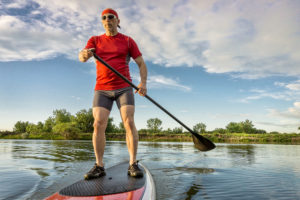 There’s something to be said for exercising outdoors. Don’t get me wrong, I love the gym, and my gym time is like meditation for me. It’s a time of reflection, a time to focus on my physical being, movement, and “inner strong man.”
There’s something to be said for exercising outdoors. Don’t get me wrong, I love the gym, and my gym time is like meditation for me. It’s a time of reflection, a time to focus on my physical being, movement, and “inner strong man.”
Lately, however, I’ve become annoyed by all the noise: the grunting warriors, blasting hip-hop music, the clanging of iron weights, and the smell of sweat. Besides, some people insist on yelling and talking the whole time.
As much as I encourage friends and other healthy seniors to join us at the gym, I understand their objections. Gyms are never clean enough, or quiet, or relaxing. They’re not meant to be. So what do I do when I get fed up at the gym?
I take it outdoors. There are so many ways of exercising outdoors. Especially if you live in a place like we do, in a paradise of year-round sun and natural beauty, a large lake, surrounded with mountain trails.
Benefits to Exercising Outdoors
I was thinking about how many added benefits to health you gain when you move your gym routine outdoors into nature. Here are a few:
- Sun exposure increases vitamin D and optimizes hormones. Sun exposure is safer between 8:00 am and 10:00 am. Let let your skin go without sun block lotion in the morning to absorb all the benefits of vitamin D exposure. Without Vitamin D, we increase our risk for all age-related diseases including cancers, high blood pressure, diabetes and autoimmune diseases. It is also necessary to prevent brittle bones which puts us at risk for falls. Wear sleeveless shirts of even tank tops.
- Nature and green spaces raise levels of serotonin. Serotonin is a natural chemical that transmits messages between nerve cells. Known as the happy chemical, serotonin plays a major role in the body by contributing to well-being, good mood, appetite, memory, and sleep. There is simply more sensory stimulation outdoors.
- Fresh air has more oxygen. Your body requires clean, clear oxygen to function. It takes in oxygen and releases waste gas in the form of carbon dioxide. Oxygen supports our life, and “oxidizes” or “burns” food to create energy and heat for our bodies. The more oxygen we can inhale the more efficient we become at fighting the free radicals that lead to many senior diseases.
- Being outdoors increases feelings of well-being and lowers depression. Sometimes after a gym workout I can feel depleted of energy and even feel down. Especially if you workout in a dark, restricted space, without sunlight, breezes and open-spaces, you can come away with a “glad-that’s-over-with” sense of relief. It’s never that way outdoors. Fortunately, we’re blessed with plenty of hills and trails and gorgeous scenery that always leaves us feeling uplifted.
- Being in nature triggers the primal regions of our brain. Exercising outdoors reduces insulin resistance, inflammation, and stimulates the release of growth factors—chemicals in the brain that send a message to grow new blood vessels and even new brain cells.
- Counteracts the effects of pollution. Air pollution is often perceived as a barrier to healthy exercise in gyms. Poor air circulation and man-made toxins such as hydrofluorocarbons which destroy the ozone layer do not exist in nature. Exercising outdoors allows the body to detoxify naturally.
- Builds your immune system. The same growth hormones that are stimulated by exercising outdoors helps fortify your immune system. That’s important to combat the predicted outbreaks of new strains of flu every season that affect older people.
I would say the best exercise routines are flexible and easily adapt to outdoor activities. If you do lunges at home or in the gym, you can find a park and to do them outdoors. Push-ups can be done off a bench, a tree, or any object where you can place your hands firmly. Perhaps we don’t take advantage of all nature has to offer.
My wife Patsi was at a conference in September held in Breckenridge, Colorado. She read a local article reporting that the area had a large population of older people who were physically active and healthier than other communities in the U.S.
Of course, the question is, do they stay healthier longer because they live in a mountain area that necessitates physical activities (like climbing, shoveling, skiing, and hiking)? Or is the community rife with healthy seniors because the unhealthy ones move away to easier climates?
Who knows, who cares! My point is, whatever climate and terrain you live in, if you stay indoors, you are missing out on some good stuff for staying healthy longer.
And I want that. Despite my faulty heart, my wreaked shoulder, my sciatica and back problems, I want to stay healthy longer, stay stronger longer. Every time I get outdoors and take a walk along the lake, or play a set of tennis, or go for a bike ride, I am invigorated, rejuvenated. I feel my 20-year-old spirit alive and kicking.
While I’ll never abandon my gym workouts, I need the variety and stimulation of the great outdoors. (Just don’t take me camping—unless there’s room service.)

Recent Comments